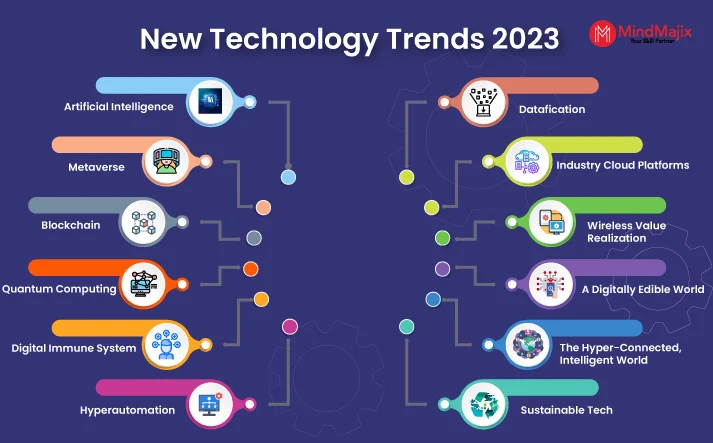When most people hear the term “blockchain,” they often think of Bitcoin and cryptocurrencies. However, the potential of blockchain technology extends far beyond digital currencies. In this article, we will explore “Blockchain Beyond Bitcoin: How It’s Disrupting Multiple Sectors,” highlighting its transformative impact on industries such as finance, healthcare, supply chain management, and more. By leveraging decentralized ledgers, smart contracts, and enhanced security features, blockchain is poised to revolutionize the way businesses operate and interact with one another.
As we delve deeper into this topic, you will learn about the various applications of blockchain technology that are reshaping traditional business models. From improving transparency and traceability in supply chains to enhancing patient data security in healthcare, the implications are vast and significant. We will also discuss real-world case studies that illustrate how companies are successfully implementing blockchain solutions to drive efficiency and innovation.
Furthermore, we will examine the challenges and limitations that come with adopting blockchain technology, as well as the future trends that could influence its evolution. Whether you are a business leader, a tech enthusiast, or simply curious about the future of technology, this article will provide you with valuable insights into how blockchain is not just a buzzword, but a powerful tool that is disrupting multiple sectors. So, read on to discover the exciting possibilities that lie ahead!
Blockchain technology, initially developed as the underlying framework for Bitcoin, has evolved into a transformative force across various industries. Its decentralized nature, transparency, and security features are driving innovation and efficiency in sectors ranging from finance to healthcare. This article explores the multifaceted impact of blockchain beyond cryptocurrency.
Blockchain in Supply Chain Management
Supply chain management is one of the most promising areas for blockchain application. By providing a transparent and immutable ledger, blockchain allows all parties involved in the supply chain to access real-time data. This transparency helps in tracking the provenance of goods, ensuring authenticity, and reducing fraud.
Moreover, smart contracts can automate various processes, such as payments and compliance checks, thereby streamlining operations. Companies like IBM and Maersk are already leveraging blockchain to enhance efficiency and reduce costs in their supply chains.
Decentralized Finance (DeFi)
Decentralized finance, or DeFi, is revolutionizing the financial sector by removing intermediaries from financial transactions. Using blockchain technology, DeFi platforms enable users to lend, borrow, and trade assets directly with one another. This not only reduces costs but also increases accessibility for individuals who may not have access to traditional banking services.
DeFi has gained significant traction, with numerous platforms offering innovative financial products. The rise of stablecoins and decentralized exchanges exemplifies how blockchain is reshaping the financial landscape.
Blockchain in Healthcare
In the healthcare sector, blockchain technology is being utilized to enhance data security and interoperability. Patient records can be securely stored on a blockchain, allowing for easy access by authorized personnel while maintaining patient privacy. This can lead to improved patient outcomes and more efficient healthcare delivery.
Additionally, blockchain can facilitate drug traceability, ensuring that medications are authentic and have not been tampered with. This is crucial in combating counterfeit drugs, which pose significant risks to patient safety.
Real Estate Transactions
Blockchain is transforming real estate transactions by simplifying the buying and selling process. Traditionally, real estate transactions involve multiple intermediaries, which can lead to delays and increased costs. With blockchain, property titles can be recorded on a decentralized ledger, making the transfer of ownership more efficient and transparent.
Smart contracts can automate various aspects of the transaction, such as escrow services and payment processing, further reducing the need for intermediaries. This innovation has the potential to make real estate transactions faster and more secure.
Blockchain in Voting Systems
Blockchain technology is being explored as a solution to enhance the integrity of voting systems. By using a decentralized ledger, votes can be securely recorded and verified, reducing the risk of fraud and ensuring transparency in the electoral process.
This application of blockchain can increase public trust in elections, as the immutable nature of the blockchain ensures that once a vote is cast, it cannot be altered. Pilot projects in various countries are already testing blockchain-based voting systems.
Intellectual Property Protection
Blockchain can play a crucial role in protecting intellectual property rights. By recording creations on a blockchain, artists and inventors can establish proof of ownership and timestamp their work. This can help in resolving disputes and ensuring that creators receive proper recognition and compensation for their work.
Furthermore, blockchain can facilitate the licensing of intellectual property, allowing for more efficient and transparent transactions between creators and consumers.
Blockchain in Energy Trading
The energy sector is witnessing a shift towards decentralized energy trading, enabled by blockchain technology. Consumers can generate their own energy through renewable sources and sell excess energy back to the grid or to other consumers using blockchain platforms.
This peer-to-peer energy trading model not only empowers consumers but also promotes the use of renewable energy sources. Companies are developing blockchain solutions to facilitate these transactions, creating a more sustainable energy ecosystem.
Blockchain and Identity Verification
Identity verification is a critical issue in today’s digital world, and blockchain offers a secure solution. By creating a decentralized digital identity, individuals can control their personal information and share it selectively with trusted parties.
This approach enhances privacy and reduces the risk of identity theft. Various organizations are exploring blockchain-based identity solutions to streamline processes such as KYC (Know Your Customer) and enhance security in online transactions.
| Sector | Impact of Blockchain | Examples |
|---|---|---|
| Finance | Enhances transparency, reduces fraud, and speeds up transactions. | Smart contracts, decentralized finance (DeFi) platforms. |
| Supply Chain | Improves traceability, reduces costs, and increases efficiency. | Provenance tracking, real-time inventory management. |
| Healthcare | Secures patient data, improves interoperability, and enhances drug traceability. | Patient records management, clinical trials tracking. |
| Real Estate | Streamlines property transactions, reduces fraud, and enhances transparency. | Tokenization of assets, smart contracts for leasing. |
| Voting | Increases security, transparency, and trust in electoral processes. | Blockchain-based voting systems. |
| Energy | Facilitates peer-to-peer energy trading and enhances grid management. | Decentralized energy marketplaces. |
| Entertainment | Empowers artists, reduces piracy, and enhances royalty distribution. | Blockchain for music rights management, NFT marketplaces. |
Conclusion
Blockchain technology is revolutionizing various sectors beyond its initial application in cryptocurrency. By enhancing transparency, security, and efficiency, it is paving the way for innovative solutions that address longstanding challenges in multiple industries.




